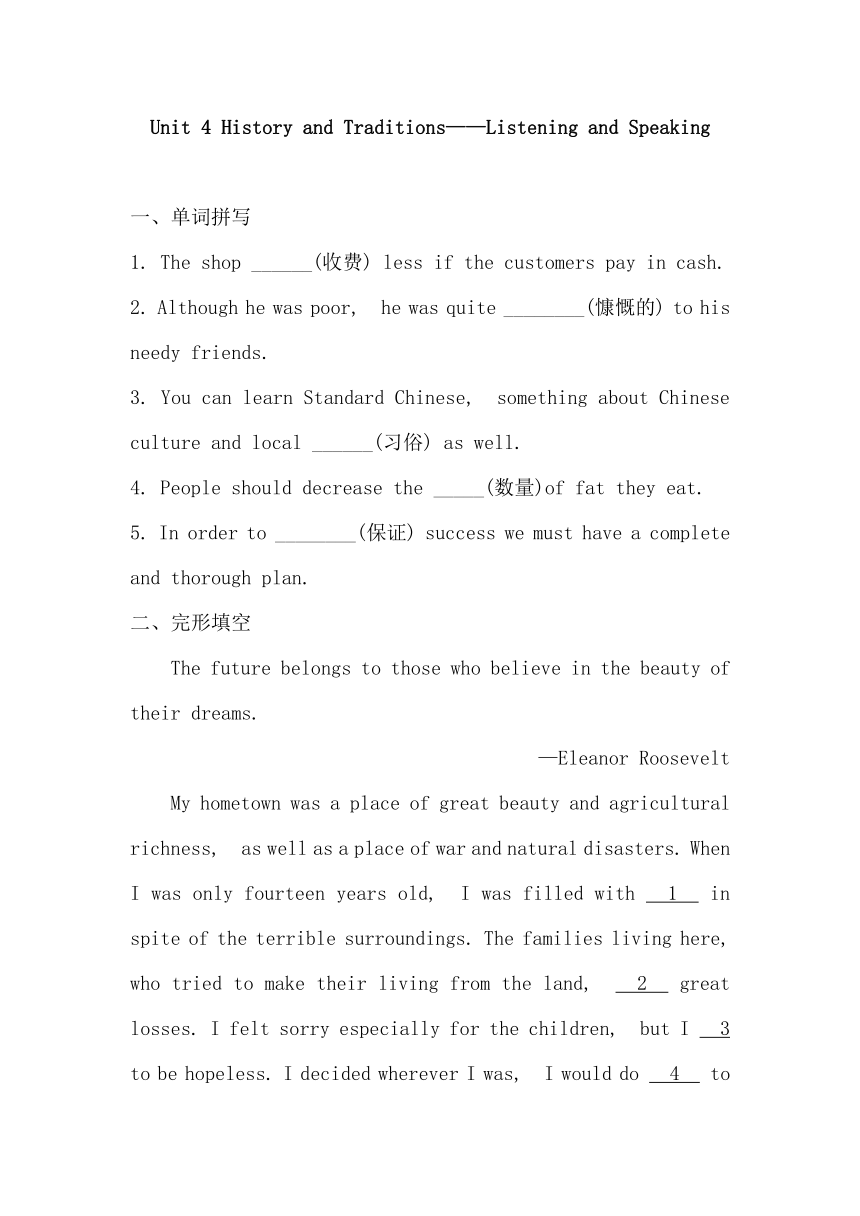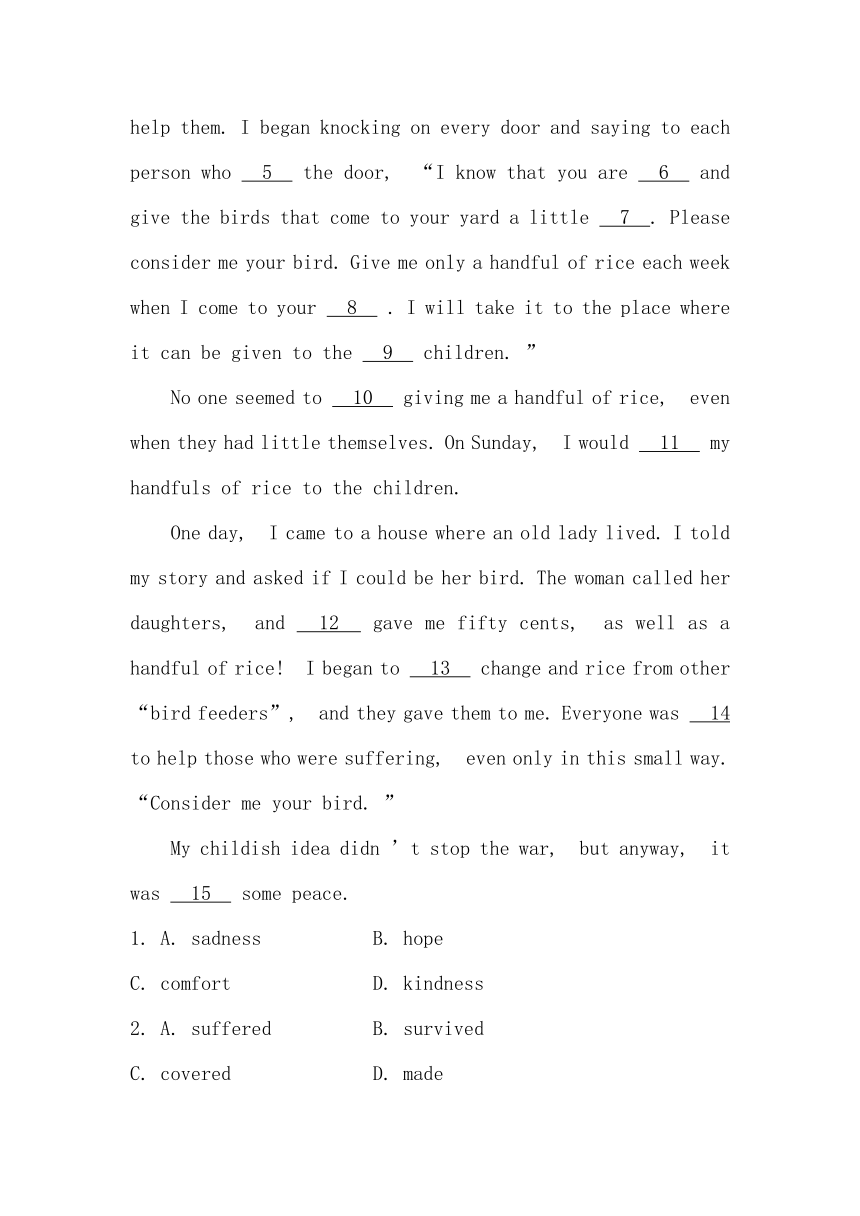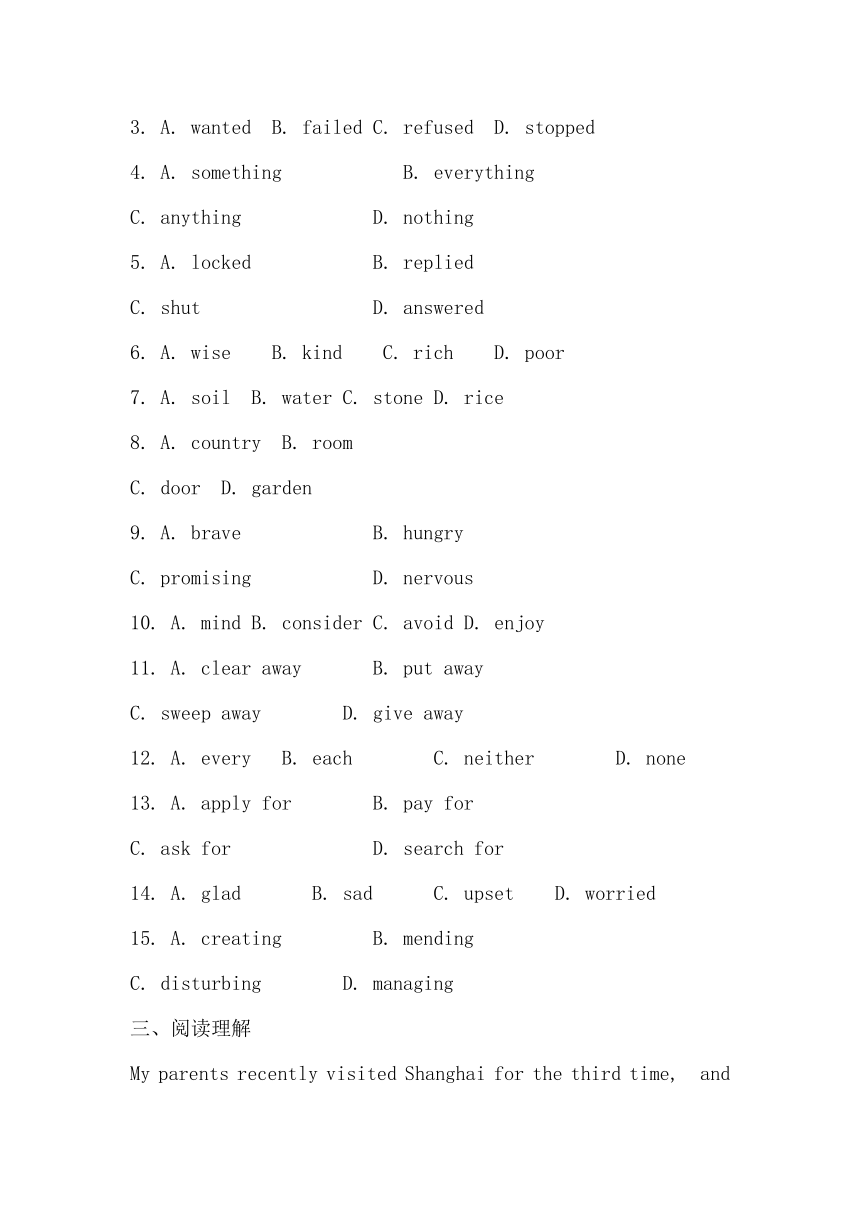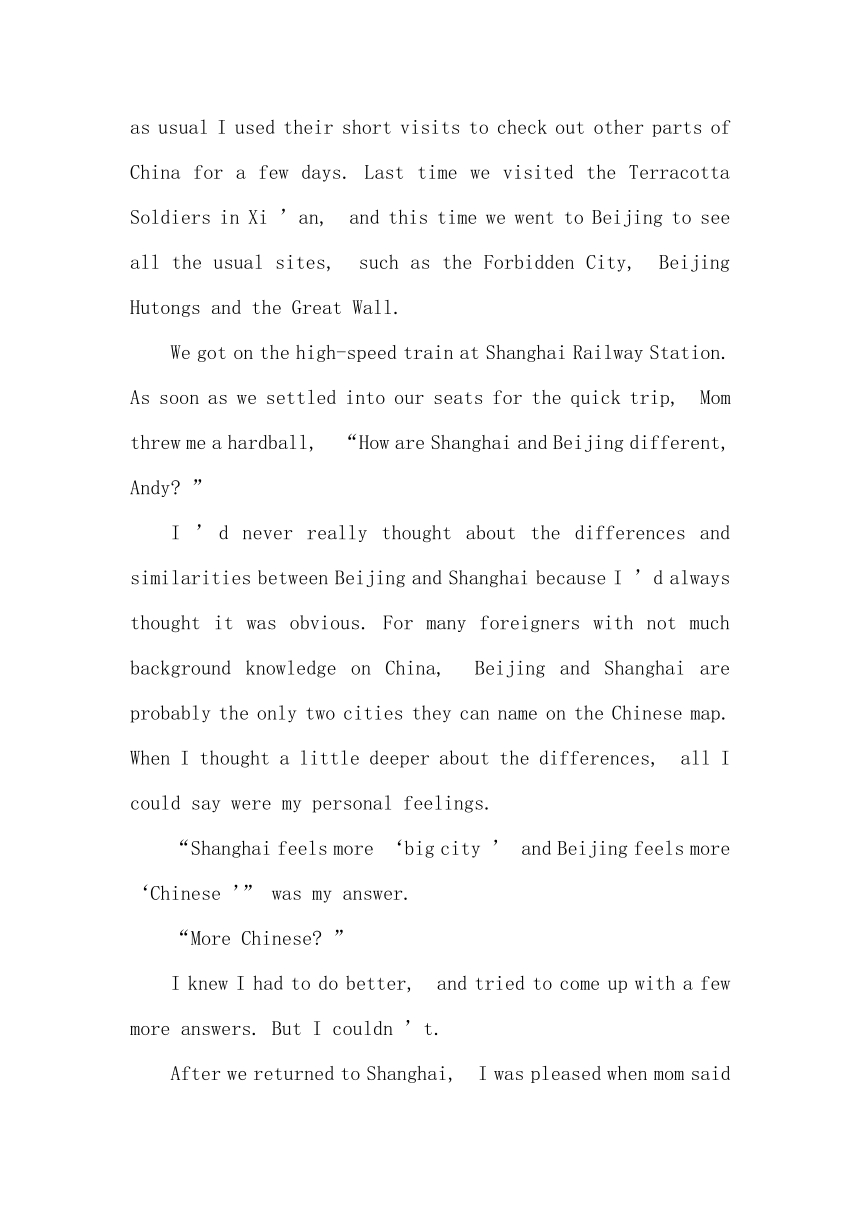高中英语人教版(2019)必修第二册Unit 4 History and Traditions-Listening and Speaking同步检测练(含答案和解析)
文档属性
| 名称 | 高中英语人教版(2019)必修第二册Unit 4 History and Traditions-Listening and Speaking同步检测练(含答案和解析) |  | |
| 格式 | zip | ||
| 文件大小 | 20.5KB | ||
| 资源类型 | 教案 | ||
| 版本资源 | 人教版(2019) | ||
| 科目 | 英语 | ||
| 更新时间 | 2022-02-23 09:27:02 | ||
图片预览




文档简介
Unit 4 History and Traditions——Listening and Speaking
一、单词拼写
1. The shop ______(收费) less if the customers pay in cash.
2. Although he was poor, he was quite ________(慷慨的) to his needy friends.
3. You can learn Standard Chinese, something about Chinese culture and local ______(习俗) as well.
4. People should decrease the _____(数量)of fat they eat.
5. In order to ________(保证) success we must have a complete and thorough plan.
二、完形填空
The future belongs to those who believe in the beauty of their dreams.
—Eleanor Roosevelt
My hometown was a place of great beauty and agricultural richness, as well as a place of war and natural disasters. When I was only fourteen years old, I was filled with 1 in spite of the terrible surroundings. The families living here, who tried to make their living from the land, 2 great losses. I felt sorry especially for the children, but I 3 to be hopeless. I decided wherever I was, I would do 4 to help them. I began knocking on every door and saying to each person who 5 the door, “I know that you are 6 and give the birds that come to your yard a little 7 . Please consider me your bird. Give me only a handful of rice each week when I come to your 8 . I will take it to the place where it can be given to the 9 children. ”
No one seemed to 10 giving me a handful of rice, even when they had little themselves. On Sunday, I would 11 my handfuls of rice to the children.
One day, I came to a house where an old lady lived. I told my story and asked if I could be her bird. The woman called her daughters, and 12 gave me fifty cents, as well as a handful of rice! I began to 13 change and rice from other “bird feeders”, and they gave them to me. Everyone was 14 to help those who were suffering, even only in this small way. “Consider me your bird. ”
My childish idea didn ’t stop the war, but anyway, it was 15 some peace.
1. A. sadness B. hope
C. comfort D. kindness
2. A. suffered B. survived
C. covered D. made
3. A. wanted B. failed C. refused D. stopped
4. A. something B. everything
C. anything D. nothing
5. A. locked B. replied
C. shut D. answered
6. A. wise B. kind C. rich D. poor
7. A. soil B. water C. stone D. rice
8. A. country B. room
C. door D. garden
9. A. brave B. hungry
C. promising D. nervous
10. A. mind B. consider C. avoid D. enjoy
11. A. clear away B. put away
C. sweep away D. give away
12. A. every B. each C. neither D. none
13. A. apply for B. pay for
C. ask for D. search for
14. A. glad B. sad C. upset D. worried
15. A. creating B. mending
C. disturbing D. managing
三、阅读理解
My parents recently visited Shanghai for the third time, and as usual I used their short visits to check out other parts of China for a few days. Last time we visited the Terracotta Soldiers in Xi ’an, and this time we went to Beijing to see all the usual sites, such as the Forbidden City, Beijing Hutongs and the Great Wall.
We got on the high-speed train at Shanghai Railway Station. As soon as we settled into our seats for the quick trip, Mom threw me a hardball, “How are Shanghai and Beijing different, Andy ”
I ’d never really thought about the differences and similarities between Beijing and Shanghai because I ’d always thought it was obvious. For many foreigners with not much background knowledge on China, Beijing and Shanghai are probably the only two cities they can name on the Chinese map. When I thought a little deeper about the differences, all I could say were my personal feelings.
“Shanghai feels more ‘big city ’ and Beijing feels more ‘Chinese ’” was my answer.
“More Chinese ”
I knew I had to do better, and tried to come up with a few more answers. But I couldn ’t.
After we returned to Shanghai, I was pleased when mom said she knew what I meant earlier about the “feeling” thing. While she loved both cities, she agreed that she had a very different feeling about them.
“With so many palaces and other historical things, Beijing felt more real, ” she said while obviously thinking deeply. “And Shanghai feels more international. ”
I couldn ’t have put it better myself!
1. What did Andy ’s parents see during their second visit to China
A. The Great Wall. B. The Forbidden City.
C. Terracotta Soldiers. D. Beijing Hutongs.
2. What does the underlined word “them” in Paragraph 7 refer to
A. Beijing and shanghai.
B. Andy ’s father and mother.
C. Andy and his mother.
D. The palaces and historical things.
3. What is the difference between Beijing and Shanghai according to Andy ’s mother
A. Their real sizes.
B. The sense of history.
C. Their names in the world.
D. The quality of transport.
4. How is the text mainly developed
A. By reasoning.
B. By giving examples.
C. By analyzing.
D. By following time order.
答案和解析
一、单词拼写
1.charges
2.generous
3.customs
4.amount
5.ensure
二、完形填空
1.B。句意: 当我只有14岁的时候, 尽管周围的环境很糟糕, 我却充满了希望。sadness难过; hope希望; comfort安慰; kindness善良。由下文讲述的故事和“I felt sorry especially for the children, but I________to be hopeless”, 可知作者充满希望, 故选B。
2.A。句意: 居住在这里的那些试图靠土地谋生的家庭遭受了惨重的损失。根据本段第一句“(我的家乡是一个非常美丽、农业发达的地方, 同时也是一个充满战争和自然灾害的地方。). ”可知这里的家庭“遭受了”战争和自然灾害造成的巨大损失, 故选A。
3.C。句意: 我特别为孩子们感到难过, 但我拒绝绝望。根据上文可知, 尽管周围的环境很糟糕, 作者却充满了希望, 因此“拒绝绝望”。故选C。
4.A。句意: 我决定无论我在哪里, 我都要做些事情来帮助他们。在肯定句中表示“一些事情”用something。故选A。
5.D。根据上文的“I began knocking on every door ”可知, 此处是指作者去敲门, 然后别人开门, answer the door意为“应声开门”, 为固定用法。故选D。
6.B。根据“and give the birds that come to your yard a little ”可知, “给来到你院子里的鸟儿一些米”是“善良的”人的举动, 故选B。
7.D。根据下文“Give me only a handful of rice. . . ”可知, 作者请求人们施舍一点米, rice为原词复现。故选D。
8.C。句意: 每周我到你门前的时候, 只给我一把米。根据上文“I began knocking on every door and. . . ”可知, 作者每周去敲门索要一把米, 故选C。
9.B。根据上文“ as well as a place of war and natural disasters. ”可知, 此处是指自然灾害导致收成不好, 作者是把要来的东西送给那些饥饿的孩子。故选B。
10.A。句意: 似乎没有人介意给我一把米, 即使他们自己没有多少。根据下文的“even when they had little themselves. ”可知, 尽管自己都没有富余的, 但没有人介意作者的请求, 故选A。
11.D。根据上文“I will take it to the place where it can be given to the children. ”可知, 作者把募集来的米分给(give away)孩子们, 故选D。
12.B。句意: 女士叫来她的女儿们, 每个人给了我五十分和一把米。由语境可知, 每一个孩子都给了作者东西。every不能单独作主语, 但each可以充当主语, 故选B。
13.C。句意: 我开始向其他“喂鸟人”要零钱和米, 他们都给了我。根据下文“and they gave them to me. ( 他们都给了我)”可知作者向他们“要”零钱和米, 故选C。
14.A。句意: 每个人都很乐意帮助那些受苦的人, 即使只是这么小的帮助。“就当我是你的鸟儿吧。”由上文“No one seemed to giving me a handful of rice, even when they had little themselves. ”可知, 人们都乐意帮助那些受苦的人, 故选A。
15.A。作者孩童般的、稚气的想法不能够阻止战争, 但是它至少能在一定程度上减少战争带来的灾难, 并且创造出一种和平。故选A。
三、阅读理解
1.C。细节理解题。根据第一段中的Last time we visited the Terracotta Soldiers in Xi ’an 可知, 安迪的父母第二次来中国时看了兵马俑。故选C。
2.A。词义猜测题。根据第七段可知, 安迪的妈妈喜欢北京和上海, 她也承认, 她对这两座城市有着截然不同的感觉, 后文则提到了她对这两个城市的看法, 所以them指的是“北京和上海”, 故选A。
3.B。细节理解题。根据倒数第二段她在沉思时说: “北京有这么多宫殿和其他历史遗迹, 感觉更真实, 上海感觉更国际化。”可知, 安迪的妈妈认为北京和上海的不同之处在于它们的历史感不同。故选B。
4.D。推理判断题。文章主要记叙了作者和父母去北京和上海这两座城市旅游, 旅游之后作者的母亲表达了自己对这两座城市的看法, 分析了它们各自的不同之处。文章主要按照时间顺序展开。故选D。
一、单词拼写
1. The shop ______(收费) less if the customers pay in cash.
2. Although he was poor, he was quite ________(慷慨的) to his needy friends.
3. You can learn Standard Chinese, something about Chinese culture and local ______(习俗) as well.
4. People should decrease the _____(数量)of fat they eat.
5. In order to ________(保证) success we must have a complete and thorough plan.
二、完形填空
The future belongs to those who believe in the beauty of their dreams.
—Eleanor Roosevelt
My hometown was a place of great beauty and agricultural richness, as well as a place of war and natural disasters. When I was only fourteen years old, I was filled with 1 in spite of the terrible surroundings. The families living here, who tried to make their living from the land, 2 great losses. I felt sorry especially for the children, but I 3 to be hopeless. I decided wherever I was, I would do 4 to help them. I began knocking on every door and saying to each person who 5 the door, “I know that you are 6 and give the birds that come to your yard a little 7 . Please consider me your bird. Give me only a handful of rice each week when I come to your 8 . I will take it to the place where it can be given to the 9 children. ”
No one seemed to 10 giving me a handful of rice, even when they had little themselves. On Sunday, I would 11 my handfuls of rice to the children.
One day, I came to a house where an old lady lived. I told my story and asked if I could be her bird. The woman called her daughters, and 12 gave me fifty cents, as well as a handful of rice! I began to 13 change and rice from other “bird feeders”, and they gave them to me. Everyone was 14 to help those who were suffering, even only in this small way. “Consider me your bird. ”
My childish idea didn ’t stop the war, but anyway, it was 15 some peace.
1. A. sadness B. hope
C. comfort D. kindness
2. A. suffered B. survived
C. covered D. made
3. A. wanted B. failed C. refused D. stopped
4. A. something B. everything
C. anything D. nothing
5. A. locked B. replied
C. shut D. answered
6. A. wise B. kind C. rich D. poor
7. A. soil B. water C. stone D. rice
8. A. country B. room
C. door D. garden
9. A. brave B. hungry
C. promising D. nervous
10. A. mind B. consider C. avoid D. enjoy
11. A. clear away B. put away
C. sweep away D. give away
12. A. every B. each C. neither D. none
13. A. apply for B. pay for
C. ask for D. search for
14. A. glad B. sad C. upset D. worried
15. A. creating B. mending
C. disturbing D. managing
三、阅读理解
My parents recently visited Shanghai for the third time, and as usual I used their short visits to check out other parts of China for a few days. Last time we visited the Terracotta Soldiers in Xi ’an, and this time we went to Beijing to see all the usual sites, such as the Forbidden City, Beijing Hutongs and the Great Wall.
We got on the high-speed train at Shanghai Railway Station. As soon as we settled into our seats for the quick trip, Mom threw me a hardball, “How are Shanghai and Beijing different, Andy ”
I ’d never really thought about the differences and similarities between Beijing and Shanghai because I ’d always thought it was obvious. For many foreigners with not much background knowledge on China, Beijing and Shanghai are probably the only two cities they can name on the Chinese map. When I thought a little deeper about the differences, all I could say were my personal feelings.
“Shanghai feels more ‘big city ’ and Beijing feels more ‘Chinese ’” was my answer.
“More Chinese ”
I knew I had to do better, and tried to come up with a few more answers. But I couldn ’t.
After we returned to Shanghai, I was pleased when mom said she knew what I meant earlier about the “feeling” thing. While she loved both cities, she agreed that she had a very different feeling about them.
“With so many palaces and other historical things, Beijing felt more real, ” she said while obviously thinking deeply. “And Shanghai feels more international. ”
I couldn ’t have put it better myself!
1. What did Andy ’s parents see during their second visit to China
A. The Great Wall. B. The Forbidden City.
C. Terracotta Soldiers. D. Beijing Hutongs.
2. What does the underlined word “them” in Paragraph 7 refer to
A. Beijing and shanghai.
B. Andy ’s father and mother.
C. Andy and his mother.
D. The palaces and historical things.
3. What is the difference between Beijing and Shanghai according to Andy ’s mother
A. Their real sizes.
B. The sense of history.
C. Their names in the world.
D. The quality of transport.
4. How is the text mainly developed
A. By reasoning.
B. By giving examples.
C. By analyzing.
D. By following time order.
答案和解析
一、单词拼写
1.charges
2.generous
3.customs
4.amount
5.ensure
二、完形填空
1.B。句意: 当我只有14岁的时候, 尽管周围的环境很糟糕, 我却充满了希望。sadness难过; hope希望; comfort安慰; kindness善良。由下文讲述的故事和“I felt sorry especially for the children, but I________to be hopeless”, 可知作者充满希望, 故选B。
2.A。句意: 居住在这里的那些试图靠土地谋生的家庭遭受了惨重的损失。根据本段第一句“(我的家乡是一个非常美丽、农业发达的地方, 同时也是一个充满战争和自然灾害的地方。). ”可知这里的家庭“遭受了”战争和自然灾害造成的巨大损失, 故选A。
3.C。句意: 我特别为孩子们感到难过, 但我拒绝绝望。根据上文可知, 尽管周围的环境很糟糕, 作者却充满了希望, 因此“拒绝绝望”。故选C。
4.A。句意: 我决定无论我在哪里, 我都要做些事情来帮助他们。在肯定句中表示“一些事情”用something。故选A。
5.D。根据上文的“I began knocking on every door ”可知, 此处是指作者去敲门, 然后别人开门, answer the door意为“应声开门”, 为固定用法。故选D。
6.B。根据“and give the birds that come to your yard a little ”可知, “给来到你院子里的鸟儿一些米”是“善良的”人的举动, 故选B。
7.D。根据下文“Give me only a handful of rice. . . ”可知, 作者请求人们施舍一点米, rice为原词复现。故选D。
8.C。句意: 每周我到你门前的时候, 只给我一把米。根据上文“I began knocking on every door and. . . ”可知, 作者每周去敲门索要一把米, 故选C。
9.B。根据上文“ as well as a place of war and natural disasters. ”可知, 此处是指自然灾害导致收成不好, 作者是把要来的东西送给那些饥饿的孩子。故选B。
10.A。句意: 似乎没有人介意给我一把米, 即使他们自己没有多少。根据下文的“even when they had little themselves. ”可知, 尽管自己都没有富余的, 但没有人介意作者的请求, 故选A。
11.D。根据上文“I will take it to the place where it can be given to the children. ”可知, 作者把募集来的米分给(give away)孩子们, 故选D。
12.B。句意: 女士叫来她的女儿们, 每个人给了我五十分和一把米。由语境可知, 每一个孩子都给了作者东西。every不能单独作主语, 但each可以充当主语, 故选B。
13.C。句意: 我开始向其他“喂鸟人”要零钱和米, 他们都给了我。根据下文“and they gave them to me. ( 他们都给了我)”可知作者向他们“要”零钱和米, 故选C。
14.A。句意: 每个人都很乐意帮助那些受苦的人, 即使只是这么小的帮助。“就当我是你的鸟儿吧。”由上文“No one seemed to giving me a handful of rice, even when they had little themselves. ”可知, 人们都乐意帮助那些受苦的人, 故选A。
15.A。作者孩童般的、稚气的想法不能够阻止战争, 但是它至少能在一定程度上减少战争带来的灾难, 并且创造出一种和平。故选A。
三、阅读理解
1.C。细节理解题。根据第一段中的Last time we visited the Terracotta Soldiers in Xi ’an 可知, 安迪的父母第二次来中国时看了兵马俑。故选C。
2.A。词义猜测题。根据第七段可知, 安迪的妈妈喜欢北京和上海, 她也承认, 她对这两座城市有着截然不同的感觉, 后文则提到了她对这两个城市的看法, 所以them指的是“北京和上海”, 故选A。
3.B。细节理解题。根据倒数第二段她在沉思时说: “北京有这么多宫殿和其他历史遗迹, 感觉更真实, 上海感觉更国际化。”可知, 安迪的妈妈认为北京和上海的不同之处在于它们的历史感不同。故选B。
4.D。推理判断题。文章主要记叙了作者和父母去北京和上海这两座城市旅游, 旅游之后作者的母亲表达了自己对这两座城市的看法, 分析了它们各自的不同之处。文章主要按照时间顺序展开。故选D。
